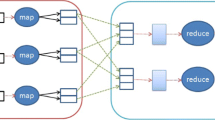Abstract
In this paper we empirically determine the settings of the most important parameters for the parallel diffusion model. These parameters are the selection algorithm, the neighbourhood shape and the neighbourhood size.
Access this chapter
Tax calculation will be finalised at checkout
Purchases are for personal use only
Preview
Unable to display preview. Download preview PDF.
Similar content being viewed by others
References
Abramson, D., & Abela, J., “A Parallel Genetic Algorithm for Solving the School Timetabling Problem”, In Proceedings of the Fifteenth Australian Computer Science Conference (ACSC-15), Volume 14, pp 1–11, 1992.
Abramson, D., Mills, G., & Perkins, S., “Parallelization of a Genetic Algorithm for the Computation of Efficient Train Schedules”, Proceedings of the 1993 Parallel Computing and Transputers Conference, pp 139–149, 1993.
Baluja, S., “A Massively Distributed. Parallel Genetic Algorithm (mdpGA)”, CMU-CS-92-196R, Carnegie Mellon University, Pittsburgh, Pennsylvania, 1992.
Cantú-Paz, E., “Designing Efficient Master-Slave Parallel Genetic Algorithms”, IlliGAL Report No. 97004, University of Illinois at Urbana-Champaign, Illinois Genetic Algorithms Laboratory, Urbana, IL, 1997.
Cantú-Paz, E., “A Survey of Parallel Genetic Algorithms”, Department of Computer Science, Illinois Genetic Algorithms Laboratory, University of Illinois at Urbana-Champaign, 1998.
DeJong, K., Sarma, J., “On Decentralizing Selection Algorithms”, Proceedings of the 6:th International Conference on Genetic Algorithms, pp 17–23. Morgan Kaufmann, 1995.
Eklund, S., “A Massively Parallel GP Architecture”, EuroGen2001, Athens, 2001.
Eklund, S., “A Massively Parallel Architecture for Linear Machine Code Genetic Programming”, ICES 2001, Tokyo, 2001.
Eklund, S., “A Massively Parallel GP Engine in VLSI “, Congress on Evolutionary Computing, CEC2002, Honolulu, 2002.
Holland, J. H., “Adaptation in Natural and Artificial Systems”, The University of Michigan Press, Ann Harbor, 1975.
Koza, J., “Genetic Programming: On the Programming of Computers by Means of Natural Selection”, MIT Press, Cambridge, MA, 1992.
Koza, J., Bennett III, F., Shipman, J., Stiffelman, O., “Building a Parallel Computer System for $18,000 that Performs a Half Peta-Flop per Day”, Proceedings of the Genetic and Evolutionary Computation Conference, pp 1484–1490, 1999.
Nordin, P., Hoffmann, F., Francone, F., Brameier, M., Banzhaf, W., “AIM-GP and Parallelism”, Proceedings of the Congress on Evolutionary Computation, pp 1059–1066, 1999.
Author information
Authors and Affiliations
Editor information
Editors and Affiliations
Rights and permissions
Copyright information
© 2002 Springer-Verlag Berlin Heidelberg
About this paper
Cite this paper
Eklund, S.E. (2002). Empirical Studies of Neighborhood Shapes in the Massively Parallel Diffusion Model. In: Bittencourt, G., Ramalho, G.L. (eds) Advances in Artificial Intelligence. SBIA 2002. Lecture Notes in Computer Science(), vol 2507. Springer, Berlin, Heidelberg. https://doi.org/10.1007/3-540-36127-8_18
Download citation
DOI: https://doi.org/10.1007/3-540-36127-8_18
Published:
Publisher Name: Springer, Berlin, Heidelberg
Print ISBN: 978-3-540-00124-9
Online ISBN: 978-3-540-36127-5
eBook Packages: Springer Book Archive




